Disclaimer: "Repo Man" is contentious and experimental in terms of exposition, form and tone; one must refrain from expatiating its shortcomings and deviations as this will directly impact the overall experience of its satirical underscoring and unrepentant subversive social commentary. Lacking a tightly written plot in the formal, strictest sense, the film's interrelated activity and consecutive, fluid scenes exist within a cumulative schematic, which is to say that its core values register progressively rather than from the outset. Despite its refusal to adhere to a definitive format or texture, surrender yourself to the characters and their bizarre, wacky interactions without scrutinising its style-over-substance construction and you will be rewarded with a de facto narrative that gloriously emphasises killer dialogue and pulsating visuals over staid, coherent cinematic conventionality. Director Alex Cox's intentions will be obvious to any student of film, but mainstream viewers will only perceive it as being "weird" or "strange", so be wary of its originality beforehand and thus you will hopefully watch it without prejudice.
Critically acclaimed due to its quotable dialogue and expedient, somewhat breakneck pace, "Repo Man" conveys its conceit without narrative depth, presenting its veiled science fiction themes as inferences to agencies, UFOs, aliens and a highly radioactive Chevy Malibu carrying top secret cargo, the vaporising effect of which is indelibly demonstrated whenever the trunk is opened by an unsuspecting cop or punk. Definitely of its time in terms of its inconspicuous exploration of 1980s socioeconomic issues and the hardcore punk movement, "Repo Man" nevertheless remains watchable on that level if one simply applies its themes to the current era. As singular as science fiction action comedies can possibly be, Alex Cox's propulsive cult masterwork captivates from the first frame, operating as an odyssey of sorts within grungy, nihilistic middle-class Los Angeles until it ventures into surrealism and establishes its own idiosyncratic punk identity.
All reviews -
Movies (55)
Repo Man review
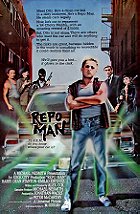 Posted : 5 years, 9 months ago on 9 September 2019 06:49
(A review of Repo Man)
Posted : 5 years, 9 months ago on 9 September 2019 06:49
(A review of Repo Man) 0 comments, Reply to this entry
0 comments, Reply to this entry
Johnny Guitar review
 Posted : 5 years, 10 months ago on 2 September 2019 12:12
(A review of Johnny Guitar)
Posted : 5 years, 10 months ago on 2 September 2019 12:12
(A review of Johnny Guitar)Cinema, at its core, extends the ordinary into the visionary; the exploration of an era or place that is unknown to us, the spectator, offering escapism into a perspicuous horizon, in this case antiquated, that differs wildly from our own. "Johnny Guitar", although wholly removed from the banalities of the everyday and realistic, scathingly probes modern human conflicts, obsessions and rivalries that simmer beneath the surface of the stoic, granite-jawed patriarchal Western model; these frailties are unearthed in the politically strained, subtext-laden interactions and veiled, embittered revelations of its fully-realised main characters, all of whom alternately conform to and subvert the sartorial and behavioural ideal of their respective genders. Framework psychologism elevates "Johnny Guitar" beyond mere Hollywood fare, with its defiance of genre conventions and high-art vivid colour patterns, theatrical set pieces and a fractious, emotionally tenuous atmosphere saturated with repressed, undisclosed desire. Vienna, the most masculine and level-headed of female Western heroes, is lusted after by most of her swaggering patrons, with whom she engages in suggestive repartee, leaving local bank owner Emma Small seething with misplaced rage, a feud that builds towards a suitably dramatic climax demonstrating the more predominant components of the genre: hangings, double-crossings and shoot-outs.
"Johnny Guitar" may occasionally submit to the tropes and trappings of its staid genre, but its riveting dialogue, plot mechanisms and subliminal deviations are where its greatness lies, and such twisted beats of aberrant, perplexing drama and psycho-sexual verve assure that its bold, highly stylised quirks coalesce into something inscrutable yet slyly radical. Baroque and nuanced, the undertones permeating each frame warrant repeat viewings, and as such, this decrees "Johnny Guitar", in all of its noir spirit and romanticism, as a daring creative high point of Western cinema.
"Johnny Guitar" may occasionally submit to the tropes and trappings of its staid genre, but its riveting dialogue, plot mechanisms and subliminal deviations are where its greatness lies, and such twisted beats of aberrant, perplexing drama and psycho-sexual verve assure that its bold, highly stylised quirks coalesce into something inscrutable yet slyly radical. Baroque and nuanced, the undertones permeating each frame warrant repeat viewings, and as such, this decrees "Johnny Guitar", in all of its noir spirit and romanticism, as a daring creative high point of Western cinema.
 0 comments, Reply to this entry
0 comments, Reply to this entry
A Clockwork Orange review
 Posted : 5 years, 10 months ago on 25 August 2019 12:36
(A review of A Clockwork Orange)
Posted : 5 years, 10 months ago on 25 August 2019 12:36
(A review of A Clockwork Orange)Pertinent, propulsive and controversial, Kubrick's "A Clockwork Orange" was infamously banned upon its initial release, perhaps unfairly so, although such notoriety inevitably led to it languishing in obscurity for decades until critical reappraisal saw it being recognised as an overlooked, maligned work of art. Elevated in mainstream popularity by cultists and film buffs alike, "A Clockwork Orange" eventually found its audience, however, as with most of Kubrick's definitive oeuvre, turgid analysis of its themes, facets, layers and ideas ensure that it remains one of his most powerful, thought-provoking and divisive compositions, asserting that we are all cogs in a vast, inscrutable, mercenary machine.
Kubrick's prescient, visionary adaptation of Anthony Burgess' 1962 novel employs atmospheric, disturbing imagery to conjure an immersive near-dystopian future so vividly mesmeric and cogent, if not so starkly devised, realised and photographed, could be perceived as paradoxically artistic in its hyper-realistic, nightmarish conceit of a society devoid of morality and compassion, as reflected in the film's economical, barren-looking housing estates. Aesthetics aside, Kubrick's satirical, obscure dissection of society's polarising, equally damaging political forces - socialism and fascism - underpin the film's visual language, from the anarchism of the first section to the authoritarianism of the last act. Despite retaining a sharp, witty verve that tempers every scene, the final half of the film enters terrifying expanse with its bleak, uncompromising exploration of a standalone arena whereby the clinical removal of free will is a means to an end in an austere, cold environment. Steadfastly skewering the political and social landscape from a 1970s perspective, Kubrick's disillusioned viewpoint of British society is eerily accurate; the Russian-inflected depiction of gang culture, replete with teenage slang and violent, territorial displays of disenfranchisement and sheer hedonism, leads to the posing of moralistic questions in the form of an experimental brainwashing technique utilised by the new government to combat mass crime, high prison rates, recidivism and reform the overwhelming delinquent youth subculture.
"A Clockwork Orange" ends on a decidedly dark note in its investigation of the concept of behaviourism, with the blackly comic, foreboding final scene adding to the film's pervasive, surreal mood and unsettling symbolism, but Kubrick's forensically detailed yet hypnotically artful production design weds the didactic themes at its core to achieve a singular perception of an apathetic world that evokes a dream-like sense of uncertainty and ambiguity upon each viewing. It is a testament to Kubrick's genius that the film has supplanted the novel it was based on, in the same way that "The Shining" is not a byproduct of its source, but a superior, code-laden work. Concerning the definitive auteurist entries in Kubrick's filmography, one must view them as individual conceptualisations, even if some are more categorical in their thematic intent than others. "A Clockwork Orange" is the most vicious, politically charged of Kubrick's exemplary cinematic output, a somewhat veiled - owing to the intense, arresting set design and chillingly effective performances - indictment of society's totalitarian response to barbarism being just as brutal and thoughtless as the criminals.
Kubrick's prescient, visionary adaptation of Anthony Burgess' 1962 novel employs atmospheric, disturbing imagery to conjure an immersive near-dystopian future so vividly mesmeric and cogent, if not so starkly devised, realised and photographed, could be perceived as paradoxically artistic in its hyper-realistic, nightmarish conceit of a society devoid of morality and compassion, as reflected in the film's economical, barren-looking housing estates. Aesthetics aside, Kubrick's satirical, obscure dissection of society's polarising, equally damaging political forces - socialism and fascism - underpin the film's visual language, from the anarchism of the first section to the authoritarianism of the last act. Despite retaining a sharp, witty verve that tempers every scene, the final half of the film enters terrifying expanse with its bleak, uncompromising exploration of a standalone arena whereby the clinical removal of free will is a means to an end in an austere, cold environment. Steadfastly skewering the political and social landscape from a 1970s perspective, Kubrick's disillusioned viewpoint of British society is eerily accurate; the Russian-inflected depiction of gang culture, replete with teenage slang and violent, territorial displays of disenfranchisement and sheer hedonism, leads to the posing of moralistic questions in the form of an experimental brainwashing technique utilised by the new government to combat mass crime, high prison rates, recidivism and reform the overwhelming delinquent youth subculture.
"A Clockwork Orange" ends on a decidedly dark note in its investigation of the concept of behaviourism, with the blackly comic, foreboding final scene adding to the film's pervasive, surreal mood and unsettling symbolism, but Kubrick's forensically detailed yet hypnotically artful production design weds the didactic themes at its core to achieve a singular perception of an apathetic world that evokes a dream-like sense of uncertainty and ambiguity upon each viewing. It is a testament to Kubrick's genius that the film has supplanted the novel it was based on, in the same way that "The Shining" is not a byproduct of its source, but a superior, code-laden work. Concerning the definitive auteurist entries in Kubrick's filmography, one must view them as individual conceptualisations, even if some are more categorical in their thematic intent than others. "A Clockwork Orange" is the most vicious, politically charged of Kubrick's exemplary cinematic output, a somewhat veiled - owing to the intense, arresting set design and chillingly effective performances - indictment of society's totalitarian response to barbarism being just as brutal and thoughtless as the criminals.
 0 comments, Reply to this entry
0 comments, Reply to this entry
All About My Mother review
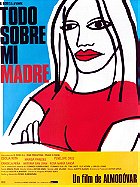 Posted : 5 years, 10 months ago on 24 August 2019 11:05
(A review of All About My Mother)
Posted : 5 years, 10 months ago on 24 August 2019 11:05
(A review of All About My Mother)Derived from several cinematic sources: the high-flown Hollywood style-over-substance ethos of Douglas Sirk and George Cukor; the psychosexual perversity of Alfred Hitchcock; the grubby transgressions of Warhol, "All About My Mother" is a lush sojourn into the banalities, crises and exoticism of a group of interconnecting Madrid women, the gender and identity of which the film ostensibly celebrates. Resplendent in its indelible, kaleidoscopic colour palette, the captivating theatrical pace, naturalistic yet demonstrative performances, hyper-realistic, sumptuous chronicle of transformation, deviation and altered states, from gender to family are propelled by authentic dialogue exchanges, visual exuberance and breezy situational, farcical comedy that can succeed tragedy. All of these themes and styles directly echo and correlate with Almodóvar's previous work, but unlike its more dramatic predecessors, "All About My Mother" is more vivid, perhaps driven by a need to design an artistic antidote to dramatic conceit, constructing an intoxicating series of acts that allow for a zealous new take on a forgotten film formula, whereby the scenery, characters and their interactions dominate the screen rather than the soapy plot; what unfolds is an accessible, distinctive, glossy modern melodrama that fully deserved its plaudits.
 0 comments, Reply to this entry
0 comments, Reply to this entry
Thelma & Louise review
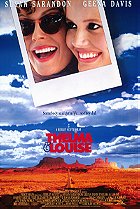 Posted : 5 years, 10 months ago on 6 August 2019 04:14
(A review of Thelma & Louise)
Posted : 5 years, 10 months ago on 6 August 2019 04:14
(A review of Thelma & Louise)"Women who are completely free of all the shackles that restrain them have no place in the world". As per the musings of many misogynistic critics during its release, "Thelma & Louise" has long secured its position as a "feminist road movie" in celluloid history, but boxing the film into any category is to detract from its eminence and reduce its cinematic gravitas. "Thelma & Louise" is not "male-bashing" in its intent despite being written by one, nor is it subject to the male gaze courtesy of its director and cinematographer, all of that is incidental; the converging lives of two friends, both of whom happen to be women, head off on a freewheeling trip to liberation from their respective tyrannical, male-dominated worlds, and although it is men who derail their plans, they save each other, not because they are women, but because they are genuine friends. After a near-rape ends with the perpetrator being shot dead, the cops are on the protagonists' tail; only one is genuinely concerned for their plight, but when considering the twists, turns and revelations that follow, the action unfolds at a breakneck pace until its iconic finale that you really must interpret the film from an impartial perspective - yes, our heroines are ultimately overpowered by the male of the species, but that is reflective of society in general. In allowing the film to overcome you as its fiery power simmers into an uncontrollable flame, this only serves to heighten and intensify the film's sedate, serene mood, albeit punctuated with searing moments of violence, malfeasance and chauvinism, from elegiac, lingering shots of the sparkling light-blue T-bird piercing through the dust-stained desert and its sun-blistered highways, to the central adventure, trials, tribulations and consolidation of two women. Whilst Thelma undergoes a transformation from oppressed, naive housewife to gun-toting, empowered independent woman, Louise exorcises demons from her scarred past, but their individual personalities are what define the somewhat fragile edges of their friendship until it becomes almost symbiotic as they end up on the border of Texas, foreboding of the situation they find themselves in as they refuse to assume their subservient roles in the patriarchy. Crucially, Thelma's fickle innocence contrasts with Louise's astute wariness, and the characters are superbly realised on screen, to the point that the strength of their eventual bond is never questioned; they are interchangeable, and their conflating journey reaches such a stage that it eclipses the world around them and ensures that they cannot revert to their old selves - they are irrevocably changed by their shared and individual experiences and so far removed from civility and normality that what is deemed socially acceptable female behaviour no longer applies to them. Although humour peppers the script throughout, the labile nature of the action culminates in a suspense-laden dramatic finale that unexpectedly shifts into magic realism when a moment of pure cinema ensues; what follows is an exultant, immeasurable shot of such magnificence that upon viewing it for the first time, it takes your breath away in its assurance that our heroines remain free.
 0 comments, Reply to this entry
0 comments, Reply to this entry
Carry on Screaming! review
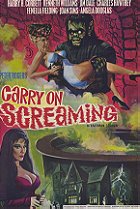 Posted : 5 years, 11 months ago on 28 July 2019 08:57
(A review of Carry on Screaming!)
Posted : 5 years, 11 months ago on 28 July 2019 08:57
(A review of Carry on Screaming!)Utilising a distinct brand of double entendre-laden humour and exemplary gothic settings, quotable dialogue and general absurdity, "Carry On Screaming!" parodies the mad doctor, vamp and mute, hirsute, and imposing physicality of monsters from the Universal era, derives its major plot points from "House of Wax" and yet, in terms of entertainment value, somehow surpasses most of what it is spoofing. I cannot exaggerate how much of a hidden gem this is, and to be frank, assert why it is so much more rewatchable than the conventions it pays side-splitting homage to; take my word for it, if you only see one highly satirical British production from the 1960s, ensure it is this particular work of overlooked comedy genius.
 0 comments, Reply to this entry
0 comments, Reply to this entry
From Beyond review
 Posted : 5 years, 11 months ago on 27 July 2019 03:48
(A review of From Beyond)
Posted : 5 years, 11 months ago on 27 July 2019 03:48
(A review of From Beyond)Like any patchy horror firmly ensconced in its typically oblique premise and perfunctory reliance on style over substance, "From Beyond" expands on H.P. Lovecraft's story and applies the tacit, condensed conceit of its source to an amorphous, low-budget visual smorgasbord of gore and special effects. Although it never quite reaches the level of quality achieved with "Re-Animator", the film successfully maintains the somewhat belted thematic verve, clinical imagery and decent performances of its predecessor through slick visuals, concise and propulsive narrative pacing and an underlying commentary on science, i.e. exploring the possible link between an overactive pineal gland and the inducement of hyper-sexuality and audio-visual hallucinatory illness. "From Beyond" does veer off into no-holds-barred body horror territory (brains are consumed, some through a victim's eye sockets) for most of its running time, but does return to its underlying message, which is the looming threat of institutionalisation within the psychiatric and scientific community. Simply put, the crux of the film further expands on the previously explored dichotomy of sanity and scientific experimentation, the latter of which is encapsulated in the form of three doctors breaking the natural law for different reasons; gravitas, carnal pleasure and psychiatric remedy. In modern society, most methodical, groundbreaking innovation and audacious deviation in the name of science is derided until it is not, but when it goes beyond the realms of the senses, as presented here in the form of gross-out, metamorphic, otherworldly creatures, then prepare for the repercussions.
 0 comments, Reply to this entry
0 comments, Reply to this entry
Dead Man's Shoes review
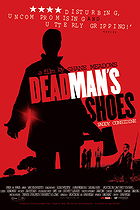 Posted : 5 years, 11 months ago on 11 July 2019 03:48
(A review of Dead Man's Shoes)
Posted : 5 years, 11 months ago on 11 July 2019 03:48
(A review of Dead Man's Shoes)Manoeuvring the revenge western template into modern day North West England, Shane Meadows' achieves this with voracious execution, deriving its palpable imagery and themes from fervently violent predecessors "Taxi Driver" and "High Plains Drifter", all the while measuring up to such influences even if it doesn't quite match them. Immersing the viewer from the outset in the plot with vague, somewhat limited establishing scenes or characterisation, Meadows operates on a guerrilla model in terms of cinematography, direction and script, allowing for an intimate, deeply affecting yet entirely stark and disturbing story to unfold at a progressive rate that never seems to override the integral aspects of the narrative. Meadows matches the hastened pace of the plot with low-budget, confounding savagery; certain pivotal scenes are aligned with the dark, powerful and uncompromising edginess reminiscent of early Martin Scorsese, albeit without adversely effecting its consummate self-contained volatility and originality.
Meadows composes a non-conforming thriller that defies its genre with verve, ensuring its more emotive values are communicated to the audience with plausibility, sincerity and authenticity. Meadows, as with other filmmakers who graduated onto higher production values, proves that budgetary constraints do not dictate the overall quality of a visual narrative; in fact, the vitality and potency of such alternative British films has rarely been replicated outside of independent cinema. Visceral, vicious and vital, "Dead Man's Shoes" fuses an alchemy of drama and thriller elements and succeeds in its attack on human evil in all of its forms, culminating in a harrowing final scene that fully hammers home the film's intent: revenge is not always sweet and the cold, clinical details illustrated in each of the vengeful executions are not gratuitously depicted, with our laconic, taciturn avenger being a dehumanised soldier who may or may not be motivated in his quest for retribution by his military training rather than out of deep love for his afflicted brother. Ingrained in the film's DNA is a sense of ambiguity and at its centre lies a tenuous morality, both of which are imperative for Meadows to imbue his characters with a semblance of three-dimensional development. "Dead Man's Shoes" is a short, sharp, shocking piece of independent cinema that firmly restrains, holding you in its grasp until releasing you at the final aerial shot.
Meadows composes a non-conforming thriller that defies its genre with verve, ensuring its more emotive values are communicated to the audience with plausibility, sincerity and authenticity. Meadows, as with other filmmakers who graduated onto higher production values, proves that budgetary constraints do not dictate the overall quality of a visual narrative; in fact, the vitality and potency of such alternative British films has rarely been replicated outside of independent cinema. Visceral, vicious and vital, "Dead Man's Shoes" fuses an alchemy of drama and thriller elements and succeeds in its attack on human evil in all of its forms, culminating in a harrowing final scene that fully hammers home the film's intent: revenge is not always sweet and the cold, clinical details illustrated in each of the vengeful executions are not gratuitously depicted, with our laconic, taciturn avenger being a dehumanised soldier who may or may not be motivated in his quest for retribution by his military training rather than out of deep love for his afflicted brother. Ingrained in the film's DNA is a sense of ambiguity and at its centre lies a tenuous morality, both of which are imperative for Meadows to imbue his characters with a semblance of three-dimensional development. "Dead Man's Shoes" is a short, sharp, shocking piece of independent cinema that firmly restrains, holding you in its grasp until releasing you at the final aerial shot.
 0 comments, Reply to this entry
0 comments, Reply to this entry
Us review
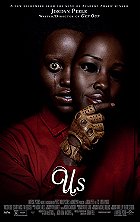 Posted : 6 years ago on 22 June 2019 06:35
(A review of Us)
Posted : 6 years ago on 22 June 2019 06:35
(A review of Us)Arriving precipitously placed in the shadow of its well-executed, subversive predecessor, "Get Out", Jordan Peele's multi-layered take on the adage "we are our own worst enemies" does fall short of eclipsing its edgier forerunner but succeeds in its scathing exploratory attack on the hypocrisies and paradoxes of the United States, the conjugal family unit and the incognizant nature of society. Peele's biting satirical verve adds an even creepier dimension to the themes explored in his films, but here they are less conspicuous and bluntly delivered to the audience as in "Get Out"; many of the allusions, motifs and symbols detract from the cohesion of the plot, which becomes increasingly convoluted and uneven towards the denouement. In punctuating the film with references as diverse as the Bible, Black Flag (Jeremiah 11:11, IIII - four) to Michael Jackson (duality) and horror movies (red boiler suit and glove/scissors reminiscent of Michael Myers and Freddy Krueger), Peele's derivative myriad of citations are the connective tissue of the eventual twist that once revealed is nowhere near as outré as it should be. In its current form, "Us", although not as witty, pervious or cogent as "Get Out", is an illustrious second entry in Peele's body of work, and although the final twist fails to truly satisfy, the unbearably creepy, foreboding feel, sharp comic relief and its fully-realized characters more than compensates for its plot and pacing pitfalls. Nevertheless, despite its faults, the faceted, diverting surface elements of the film usurp the coiled interpretive model that the script employs as it progresses; if you enjoy a pretentiously written and delivered horror film in the same vein as "Hereditary", then I would highly recommend it.
 0 comments, Reply to this entry
0 comments, Reply to this entry
An American Werewolf in London review
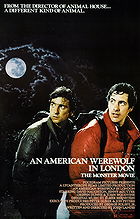 Posted : 6 years, 2 months ago on 20 April 2019 09:06
(A review of An American Werewolf in London)
Posted : 6 years, 2 months ago on 20 April 2019 09:06
(A review of An American Werewolf in London)Somewhat innovative, tempered and imprecise in its amalgamation of horror and comedy, "An American Werewolf in London" nevertheless succeeds in its all of its impenitence and so-real-it's-surreal tonality. Chiefly appreciated for its visceral horror and gross-out effects suffused with anxious existentialism, the film misfires in its sacrificing of character development and narrative coherence for protraction of the signature werewolf transformation scene concerning the focal point of the story, Jewish-American backpacker David Kessler. From its opening scene, a sense of inevitability as well as a defined narrative template is established as David and his wisecracking friend fail to heed the advice of a collectively hexed group of particularly hostile, protectionist Yorkshire locals, thus ending up gruesomely ravaged by a lycanthrope. Tongue-in-cheek, mostly well-executed playful situations, including a naked zoo escape, the witticisms and deadpan slights of his cursed, undead friend, and bumbling police investigators befall David in the direct aftermath of the attack, marking a recurring dichotomy of sorts whereby graphic gore is juxtaposed with dark humour laden with adroit social commentary. In championing the use of allegorical Jewish otherness and comic subversion, John Landis shrewdly reduces the horror onslaught by imbuing the film with a hilarious edginess and paranoia-induced monstrosity that manifests in the form of a werewolf should the victim submit to the superstitious anxieties of small-minded xenophobes, an emendation that serves to render the film even more relevant today. As nightmares, one of which involves zombie Nazis, and reality assemble, the interminably doomed David falls in love with his nurse upon leaving hospital, thus enabling a series of murders to occur at a breakneck pace, and as such, the story arrives at its denouement and end in rather abrupt "shock value" fashion.
Despite misguided dramatic timing and a tendency to saturate the story with persistent measures of comedy rather than cohesive transition in terms of plot and pacing only serves to diminish its power as a cohesive entity rather than enhance; the shards of surrealism that do punctuate the film are its biggest strengths, and that more than elevates it to cult classic status, any technical faults notwithstanding.
Despite misguided dramatic timing and a tendency to saturate the story with persistent measures of comedy rather than cohesive transition in terms of plot and pacing only serves to diminish its power as a cohesive entity rather than enhance; the shards of surrealism that do punctuate the film are its biggest strengths, and that more than elevates it to cult classic status, any technical faults notwithstanding.
 0 comments, Reply to this entry
0 comments, Reply to this entry
 Login
Login
 Home
Home 4 Lists
4 Lists 55 Reviews
55 Reviews Collections
Collections